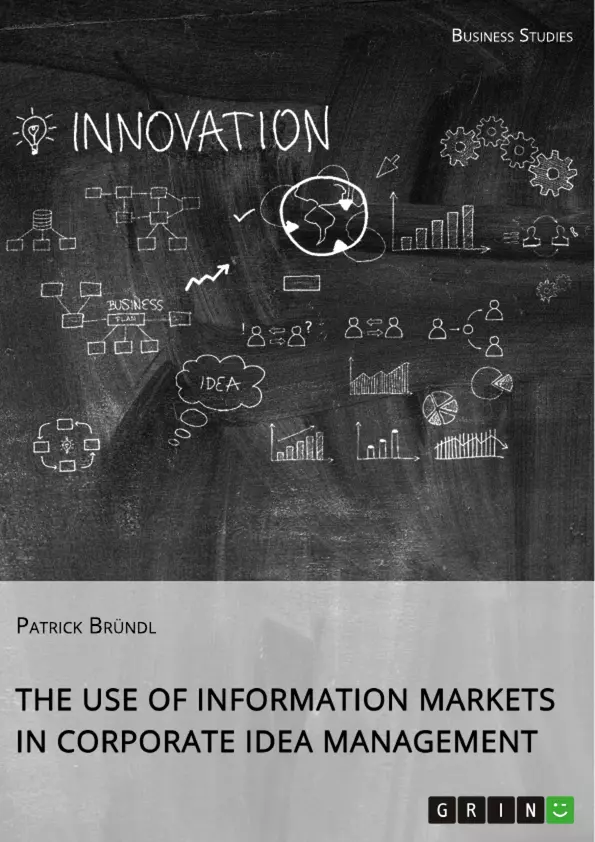The use of digital trading platforms tremendously gained on interest during the Corona crisis. The possibility to trade stocks oneself via mobile applications lead to a significant rise in interest in financial markets. However, such trading places are not only used for stock trading. For many years, information markets have been a reliable tool for predicting events, especially in the field of politics, sports or movie business. Due to the high prediction accuracy and the high innovation pressure on companies, the question arises whether such markets are suitable for evaluating ideas in companies. For this purpose, 36 articles from journals and conference proceedings were consulted in the context of a systematic literature review. Thereby, nine topic areas could be found in which reasons against the implementation of information markets for this use case exist. The topics in descending order of the number of assigned articles are: Accuracy, Manipulation, Motivation, Complexity, Costs, Knowledge, Confidentiality, Organization and Legal. The research results were also analyzed according to the geographic profile, the publication numbers over time, as well as according to their keywords.
Inhaltsverzeichnis (Table of Contents)
- Introduction
- Problem definition
- Objective and progress
- Theoretical basics and state of research
- Information markets
- Prediction markets
- Preference markets
- Idea markets
- Idea management
- Methodology
- Results
- Temporal evaluation
- Applied methodology
- Countries of origin
- Keyword evaluation
- Referred subject areas
- Discussion
Zielsetzung und Themenschwerpunkte (Objectives and Key Themes)
This study aims to analyze the suitability of information markets for evaluating ideas within companies. It investigates existing literature and real-world applications to understand the potential benefits and drawbacks of this approach. The research focuses on identifying key factors that influence the success or failure of information markets in this context.
- Evaluating the potential of information markets for idea management in companies
- Analyzing the effectiveness of information markets as a tool for idea selection and evaluation
- Identifying the challenges and limitations of implementing information markets in corporate environments
- Examining the factors that influence the success or failure of information markets for idea evaluation
- Exploring the current state of research and practice regarding the use of information markets in corporate idea management
Zusammenfassung der Kapitel (Chapter Summaries)
The introduction provides a brief overview of the increasing interest in online trading platforms during the Corona crisis and the potential applications of information markets beyond financial trading. It highlights the challenge of idea evaluation in companies and the potential of information markets to address this issue.
The chapter on theoretical basics and state of research explores the different types of information markets, including prediction markets, preference markets, and idea markets. It also provides an overview of the current state of research in the field of idea management.
The methodology chapter describes the approach used to conduct the systematic literature review, including the criteria for selecting relevant articles and the methods for analyzing the collected data.
The results chapter presents the findings of the literature review, focusing on the identified challenges and limitations of using information markets for idea evaluation in companies. It also examines the geographical distribution and temporal evolution of research in this field, as well as the key keywords and subject areas.
The discussion chapter provides a detailed analysis of the findings and their implications for both academia and practitioners. It explores the reasons behind the slow adoption of information markets for idea evaluation in companies and discusses the potential for future research.
Schlüsselwörter (Keywords)
The study focuses on the key topics of information markets, idea management, corporate innovation, systematic literature review, idea evaluation, and decision-making. It explores the potential benefits and drawbacks of information markets as a tool for idea selection and evaluation in companies, considering aspects such as accuracy, manipulation, motivation, complexity, costs, knowledge, confidentiality, organization, and legal implications.
Frequently Asked Questions
What are Information Markets in a corporate context?
Information markets are digital trading platforms where employees can "trade" ideas or predictions, using market mechanisms to evaluate the potential success of new concepts.
How can Idea Markets help with innovation?
They leverage the "wisdom of the crowd" to predict which ideas are most likely to succeed, providing a more accurate evaluation than traditional top-down management decisions.
What are the main challenges in implementing these markets?
The study identifies nine main barriers: Accuracy, Manipulation, Motivation, Complexity, Costs, Knowledge, Confidentiality, Organization, and Legal issues.
Is manipulation a problem in corporate information markets?
Yes, manipulation is a significant concern, as participants might try to influence the "price" of an idea for personal gain or to favor specific projects.
Why did interest in digital trading platforms rise during the Corona crisis?
The rise of mobile trading apps and the shift to digital interaction led to a general increase in interest in financial and information markets as tools for prediction and investment.
- Quote paper
- Patrick Bründl (Author), 2021, The Use of Information Markets in Corporate Idea Management, Munich, GRIN Verlag, https://www.grin.com/document/1164755



